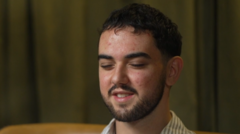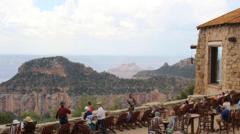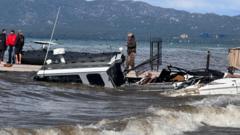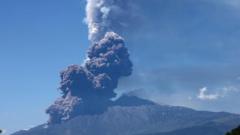Calum Macdonald, a survivor of methanol poisoning in Laos that left him blind, shared his harrowing experience as he advocates for awareness about the dangers of contaminated alcohol. The incident also led to the tragic deaths of several others, prompting families to push for clearer travel advisories from authorities.
Survivor Speaks Out Against Methanol Poisoning After Losing His Sight

Survivor Speaks Out Against Methanol Poisoning After Losing His Sight
Calum Macdonald recounts the life-altering experience of methanol poisoning in Laos, sharing his story and calling for greater awareness of the dangers associated with contaminated alcohol.
When Calum Macdonald briefly crossed the Vietnamese border, he was met with a disorienting "kaleidoscopic blinding light” that marked the onset of a harrowing experience. The 23-year-old had just arrived after an overnight bus journey from Vang Vieng in Laos, where he had been enjoying free whisky and vodka shots at a local hostel. Initially, he attributed his unusual vision to potential food poisoning, but the alarming reality set in when he realized he was completely blind upon reaching his hotel in Vietnam, despite the lights being on.
Calum now recounts his story for the first time, as he becomes one of several victims affected by a tragic methanol poisoning incident in November, which claimed the lives of six people – including two Danish girls he had socialized with at the hostel. Now back in the UK, he collaborates with the families of three other British victims to urge the Foreign Office to enhance its warnings about the risks of methanol poisoning while traveling abroad.
Among the victims was Simone White, who just a day later enjoyed the same free shots. Shortly after, she was hospitalized and soon fell into a coma after her mother received an urgent call for permission for life-saving surgery. Despite immediate action, Simone tragically passed away from methanol poisoning, leaving her family devastated.
Methanol is a hazardous type of alcohol often encountered in industrial products and poorly made drinks. Unlike ethanol, the type found in alcoholic beverages, methanol is particularly dangerous. Contamination can occur in cheaper spirits, a known hazard in Southeast Asia, where numerous cases of poisoning are reported annually, according to the charity Doctors Without Borders.
Symptoms of poisoning can resemble those of a common hangover, making it difficult for individuals to recognize the severity of their condition. Serious effects often arise within hours, resulting in seizures, blurred vision, and in severe cases, total blindness or even death.
Calum is not alone in this battle; Kirsty McKie, for example, lost her life to the same menace in Bali, where she unknowingly consumed contaminated alcohol at home before a night out. Like many victims, her friend survived but was left grappling with feelings of guilt and confusion about the arbitrary nature of survival.
Cheznye Emmons faced a similarly grim fate after consuming gin containing dangerously high levels of methanol, a harrowing experience described by her mother, who recounted her daughter’s last fearful moments in the hospital.
Reflecting on his experience, Calum advises tourists to avoid free drinks while traveling and instead opt for reputable beverages. Coming to terms with his blindness was deeply impacted by learning about the others who didn’t survive, stirring within him a sense of responsibility to educate others about the dangers of methanol poisoning.
Calum is currently learning to navigate life with a cane and has plans to acquire a guide dog, aiming to transform his painful experience into a beacon of awareness for others. The Foreign Office acknowledged the risks associated with methanol poisoning, pledging to work with local authorities to better inform British travelers about the dangers of counterfeit alcohol and promote safety through travel campaigns.




















